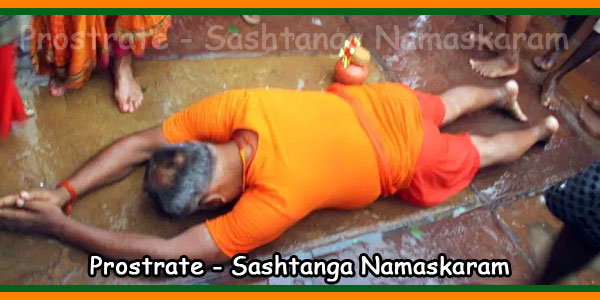Indians prostrate/Sashtanga Namaskaram themselves before their parents, elders, teachers, and noble souls by touching their feet. The old man in turn blesses us by placing his hand on or above our heads. Prostration is done daily when we meet older people and especially on important occasions such as the beginning of a new task, birthdays, festivals, etc. In some traditional circles, prostration is accompanied by abhivaadana, which serves to present oneself, to announce one’s family and social stature.
The man stands on his feet. Touching the feet in prostration is a sign of respect for the age, maturity, nobility and divinity that personify our elders. It symbolizes our gratitude for their selfless love for us and the sacrifices they made for our well-being. It is a way of humbly recognizing the greatness of another. This tradition reflects strong family ties, which have been one of India’s strengths.

The good wishes (Sankalpa) and the blessings (Aashirvaada/Aashirvaadam) of the elders are very much appreciated in India. We bow down to look for them. Good thoughts create positive vibrations. The good wishes that come from a heart full of love, divinity and nobility have enormous strength. When we prostrate ourselves with humility and respect, we invoke the good wishes and blessings of the elders, who flow in the form of positive energy to envelop us. This is why the assumed position, whether standing or upside down, allows the whole body to receive the energy thus received.
The different forms of showing respect to elders are:
Pratuthana: Get up to receive a person.
Namaskaara: Paying homage in the form of namaste.
Upasangrahan: Touching the feet of older people or teachers.
Shaashtaanga: Prostrate completely with your feet, knees, stomach, chest, forehead and arms touching the ground in front of the elders.
Pratyabivaadana: Returning a greeting.
The rules are prescribed in our scriptures as to who should prostrate themselves before whom. Wealth, name, age, moral strength and spiritual knowledge in increasing order of importance qualified men to receive respect. That is why a king, though the head of the earth, would bow to a spiritual master. Epics like Ramayana and Mahabharata have many stories that highlight this aspect.
